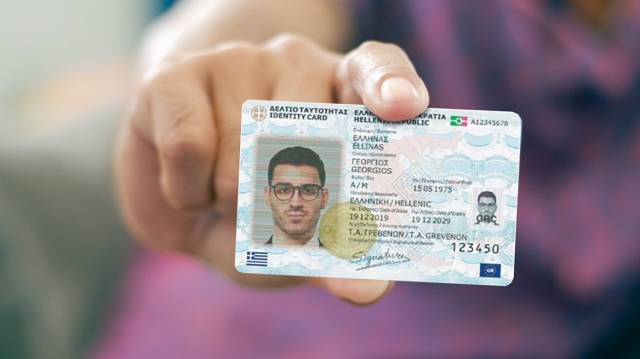The issuance platform for the Personal Number is now live.
Citizens can obtain their Personal Number themselves via myinfo.gov.gr or pa.gov.gr. Those who do not take action will have a Personal Number automatically assigned to them starting September 5.
The Personal Number has two key functions. It acts as a single identification number for all interactions between citizens and public services, reducing the need for multiple IDs. Additionally, it helps correct errors and discrepancies created by disconnected government registries, enhancing the quality and speed of public service delivery.
Previously, citizens relied on four distinct identification numbers. With the introduction of the Personal Number, each citizen’s data will be consistently, accurately maintained across all major state registries—with full respect for personal data privacy.
Frequently Asked Questions About the Personal Number
1. What is the Personal Number (P.A.) and what does it do? • The P.A. verifies individuals’ identities in their dealings with public sector entities.
2. When can citizens receive their P.A.? • Citizens can start obtaining their P.A. from Tuesday, June 3rd, by visiting pa.gov.gr for a detailed guide that will direct them to the myinfo.gov.gr platform.
3. Can a citizen without an AFM obtain a P.A.? • An AFM (Tax Identification Number) is required to issue a P.A. Citizens must first apply for an AFM through the AADE.
4. Do citizens need to obtain a P.A. before getting a new ID card? • Citizens must first acquire a P.A. to get a new identity card. The P.A. must be issued before the new ID card can be processed; this can be done via the myinfo.gov.gr platform for those with Taxisnet credentials.
5. Should citizens who already have a new ID without the P.A. get a new one? • There is no need to replace a new ID card issued without a P.A.; it remains valid until its expiration or replacement.
6. What if a citizen wants to add the P.A. to their existing new ID card?
• Citizens wishing to update their ID card to include the P.A. can request a replacement, following the regular procedure and submitting the necessary documentation.
7. How can citizens lacking digital skills or Taxisnet credentials obtain a P.A.?
• Assistance will be available from Citizens’ Service Centers (KEP) and Consular Authorities for citizens lacking digital skills, effective June 23.
8. Is the P.A. secure?
• The P.A. is an identification number only and is not used to access any registries, ensuring its security.
9. What information can’t a citizen correct? What should they do if they find errors in the Civil Registry?
• Citizens verify the accuracy of their name, date of birth, municipality, AMKA, and ID number. If discrepancies exist, they should contact their Municipal Registry for corrections.
10. Is the P.A. a means of collecting citizens’ personal data?
• Contrary to some claims, the P.A. simplifies identification for public services and helps address issues from fragmented registries, enhancing service delivery while safeguarding personal data.
11. How is personal data protected?
• Compliance with the strict regulations of the Hellenic Data Protection Authority (HDPA) ensures personal data protection while facilitating easier citizen interactions with the state.
12. How is data protection achieved through the P.A.?
• Protection is ensured by verifying identity securely, using a single identifier, minimizing personal data exposure, and applying data protection measures by design.
13. Does the P.A. lead to profiling of citizens?
• On the contrary; the P.A. resolves long-standing administrative challenges arising from multiple registries, ensuring citizens no longer face redundant processes.
14. How often is the P.A. assigned, and can it change?
• The P.A. is assigned once, remains unique, and does not change throughout an individual’s life.
15. What is the structure of the P.A.?
• The P.A. contains 12 alphanumeric characters, including at least 9 digits, with a format consisting of 3 prefix characters followed by the individual’s 9-digit Tax Identification Number (AFM) at the time of issuance.
16. Which characters are allowed in the P.A.?
• The P.A. can include digits 0-9 and uppercase letters from the Greek alphabet that have corresponding Latin forms. The third character serves as a validity check digit.
17. How and when is the P.A. issued?
• Citizens can issue their P.A. via the myinfo.gov.gr platform by confirming their information. Initially, they can choose 2 of the 3 alphanumeric characters. Starting September 5, those who haven’t acted will have their P.A. automatically assigned.
18. What is the current identification model for citizens in Greece and its issues?
• The decentralized model means each authority identifies citizens separately, leading to disconnected registries and data inconsistencies.
19. Why is the P.A. necessary?
• It creates a unified digital policy to ensure secure identification, improves service delivery, protects privacy, and enhances system interoperability.
20. What are the benefits of integrating the P.A. into identity cards?
• This integration links physical and digital identification, enhances security, improves citizen services, and makes it easier for citizens to remember their P.A.
21. How can citizens update their contact information?
• Changes can only be made through the National Communication Registry (EMEp) at emep.gov.gr.
22. What should a citizen do upon finding an error in their data?
Citizens validate their personal details and ensure that Public Administration registries are updated correctly. If discrepancies remain, they should reach out to their Civil Registry Office.
23. How is information confirmation completed?
• The citizen submits the correction, and registries are automatically updated with the accurate details.
24. Who can confirm information or issue a P.A. for minors?
• Legal guardians can perform this task. If their relationship is electronically confirmed, they can complete it via myinfo.gov.gr; otherwise, a visit to a KEP or Consulate is necessary.
25. Can citizens correct information for others?
• Yes, they can address corrections for their minor children or individuals under their guardianship.
26. How are individuals under judicial support handled?
• They are assisted through visits to a KEP with the appropriate documentation.
27. How are expatriate citizens assisted?
• Expatriates with TaxisNet credentials can use myinfo.gov.gr; others can receive support at Consular Authorities.
28. What if someone fails to confirm their data?
• They won’t be able to issue a P.A. with the option to select alphanumeric characters through myinfo.gov.gr or at KEP or Consulates.
29. What applies to Third Country Nationals?
• They can issue a P.A. provided they have an AFM. Currently, they cannot correct registry data if not registered in the Ministry of Interior’s Civil Registry; future updates will integrate this registry.
30. How can one issue a P.A.?
• There are three options:
A. Online via myinfo.gov.gr
B. In-person at a KEP
C. In-person at a Consular Authority
31. What is needed to issue a P.A. through a KEP or Consulate?
• In-person presence (except for those under full legal incapacity) and submission of necessary documents.
32. How is the P.A. issued?
• Citizens log into myinfo.gov.gr, confirm their details, and select “Issue P.A.”
- A prefix consisting of 3 alphanumeric characters
- Options for the initial 2 characters: 10 digits (0–9) and 14 uppercase Greek letters with matching Latin homoglyphs
• The 3rd character is a generated check digit for validation
• Citizens select “Issue P.A.”
33. What do citizens need to access the myinfo.gov.gr service?
• Taxisnet credentials (GGPSYΔ) and a registered mobile number in the National Communication Registry (EMEp) for two-factor authentication (SMS/OTP).
34. What functionalities does the myinfo.gov.gr application provide?
• Citizens can view their information in government registries, confirm or request corrections, issue a P.A. (including selection of the first 2 characters), and utilize similar features for:
◦ Minor dependents
◦ Individuals under guardianship (via KEP or Consular Authorities).
Procedure for Issuing the Personal Number (P.A.)
• Citizens access the myinfo.gov.gr platform using their TaxisNet credentials and two-factor authentication (OTP), sent to their registered mobile number within the National Communication Registry (EMEp – emep.gov.gr).
• They receive a comprehensive view of their personal data as recorded in the Civil Registry and confirm their identifiers for:
a) Civil Registry of the Ministry of Interior
b) Tax Registry of the Independent Authority for Public Revenue (IAPR)
c) Unified AMKA-EMAES Registry of the e-Government Center for Social Security (IDIKA S.A.)
d) ID Card Registry for Greek Citizens maintained by the Hellenic Police (EL.AS.)
e) National Communication Registry (EMEp) administered by the General Secretariat of Information Systems and Digital Governance.
• Next, they select “Edit Information” and confirm the following fields as “Correct” or “Incorrect”:
- Full name and date of birth (from the Civil Registry)
- Municipality of registration
- AMKA
- ID card number (ΑΔΤ)
- Tax Identification Number (AFM)
- Contact details (mobile, email, and address) – these can only be updated via EMEp.
• If they mark information as “Incorrect”, they will provide the corrected data.
• After confirming their full name, date of birth, municipality, AMKA, and ID number, primary registries of Public Administration will be updated accordingly.
If the provided information does not match the Civil Registry, citizens must contact the Civil Registry Office to address discrepancies.
• To issue the P.A., they select “Issue P.A.” and choose the first two digits from a dropdown of 24 alphanumeric characters: 10 digits (0–9) and 14 uppercase Greek letters with visually similar counterparts (homoglyphs) in the Latin alphabet. The third character is an automatically generated check digit.
• The process concludes when the citizen clicks “Issue P.A.”
Note:
Each individual receives the P.A. only once, making it unique and unchanging throughout life.
After September 5, the P.A. will be automatically assigned to all citizens who have not taken action to obtain it.
Furthermore, by confirming their information on myinfo.gov.gr, citizens can also issue a P.A. for their minor children, provided the children have an AFM (Tax Identification Number).
Citizens residing abroad who have TaxisNet credentials can obtain their P.A. via myinfo.gov.gr.
Those who do not possess TaxisNet credentials or lack digital skills (e.g., elderly citizens) can issue a P.A. at KEP offices or at Consular Authorities from June 23.
Ask me anything
Explore related questions

















